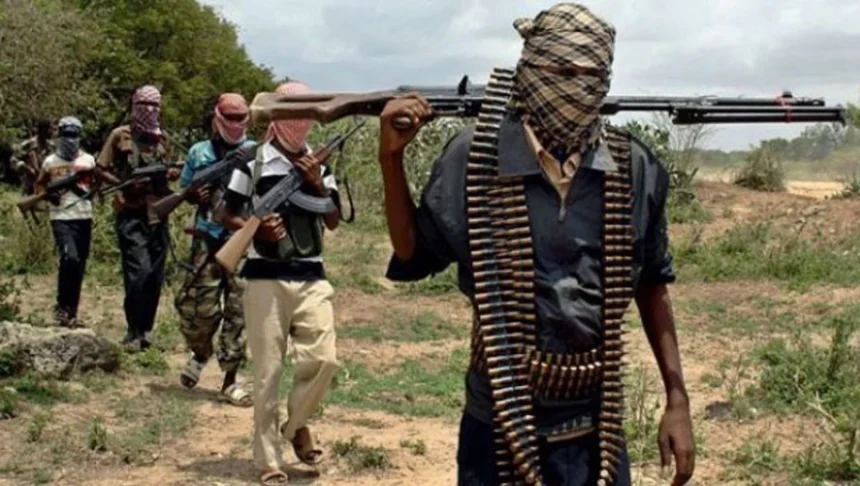Gunmen in Zamfara State Demand Levies from Villages, Displacing Hundreds of Residents
In recent reports, gunmen operating in the Tsafe West area of Zamfara State, Nigeria, have imposed a staggering levy of N172.7 million on 25 villages, instilling fear among residents and driving many from their homes. These criminal groups, which have been a significant source of instability in the region, have once again used intimidation and violence as their tools to extract large sums of money from these vulnerable communities. The gunmen are reportedly led by the notorious bandit leader, Danisuhu, whose name has become synonymous with terror in northern Nigeria.
The demands made by these bandits are not limited to cash; they have also asked for in-kind contributions, such as bags of soybeans, further exacerbating the economic hardship faced by the targeted villages. The brutal combination of monetary extortion and forced contributions highlights the growing power and influence of criminal groups in the region, as well as the inability of local authorities to protect civilians from these attacks.
Background on the Crisis in Zamfara State
Zamfara State, located in the northwestern part of Nigeria, has been a hotspot for violent banditry for several years. The rise of armed groups, commonly referred to as bandits, has led to widespread insecurity, with these criminal groups engaging in kidnapping for ransom, cattle rustling, and violent attacks on both civilians and security forces. While the Nigerian government has made efforts to address the situation, the problem persists, with many local communities left at the mercy of these armed groups.
One of the key drivers of banditry in Zamfara State is the lack of effective policing and security infrastructure. The geographical expanse of the state, combined with porous borders and a lack of resources, has allowed these bandit groups to operate with relative impunity. Moreover, the economic difficulties faced by many communities have made them highly vulnerable to the demands of these criminals. In many instances, the bandits target villages where they know the population is already struggling, making it more likely that the residents will comply with their extortion demands out of fear of reprisal.
The situation in the Tsafe West area, in particular, has become dire as a result of these extortion activities. The gunmen, under the leadership of Danisuhu, have been reported to impose huge levies on several villages, and the latest figure of N172.7 million reveals the growing scale of the extortion racket.
The Levies and Their Impact on Local Communities
According to reports from Zagazola Makama, a prominent counterinsurgency publication focusing on the Lake Chad region, the bandits have targeted several villages in Tsafe West, each with a unique set of demands. The affected communities now find themselves under intense pressure, as the bandits have been clear in their threats: those who fail to comply with the levies face violent reprisals.
The breakdown of the levies is as follows:
- Gijinzama: N8.5 million
- Dakolo: N5 million and 20 bags of soybeans
- Gunja: N7 million
- Kauyen Kane: N5 million
- Kurar Mota: N6 million
- Kunchin Kalgo: N20 million (the highest levy)
- Sungawa: N15 million
- Rakyabu: N15 million
These amounts represent an enormous financial burden on already impoverished villages. The demand for bags of soybeans in addition to cash further illustrates the level of exploitation. For these villages, meeting these demands would require diverting funds from other essential needs such as food, healthcare, and education, which are already scarce in the region.
The threat of violence is perhaps the most insidious aspect of this extortion. Reports suggest that the gunmen have been issuing clear and direct threats of retaliation against anyone who fails to meet their demands. This has created an atmosphere of fear and uncertainty, with many residents fleeing their homes to escape potential harm. The gunmen’s reputation for brutal violence is well-known in the region, and their threats are taken seriously. This has led to the displacement of hundreds of people, who are now left to face the challenges of finding shelter, food, and safety in other areas.
Forced Displacement and the Humanitarian Crisis
The levies imposed by the gunmen have not only caused economic strain on the affected communities, but they have also triggered a significant humanitarian crisis. Hundreds of people have been forced to leave their homes in fear of violent reprisals. These displaced individuals now find themselves living in temporary shelters, struggling to survive without access to basic services and resources.
The displaced residents are also at risk of exploitation and further victimization, as they are often forced to live in overcrowded conditions where they are vulnerable to disease, malnutrition, and further attacks from criminal groups. In addition, the displacement of these people has strained neighboring villages, which may not have the resources to accommodate large numbers of refugees. The influx of displaced individuals could also lead to social tensions, as competition for limited resources intensifies.
Local authorities and humanitarian organizations face immense challenges in providing assistance to the displaced people. Despite efforts to address the situation, the ongoing insecurity in the region makes it difficult for aid organizations to reach those in need. Furthermore, the Nigerian government has been criticized for its inability to effectively deal with the growing menace of banditry, leaving many communities to fend for themselves.
The Role of Bandit Leader Danisuhu
Danisuhu, the alleged leader of the group behind the levies in Tsafe West, is a well-known figure in the world of organized crime in northern Nigeria. His name has become synonymous with terror in the region, and he is believed to be behind numerous violent attacks on both civilians and security personnel. Reports suggest that he leads a large gang of armed bandits who are involved in a wide range of criminal activities, including kidnapping, extortion, and robbery.
Danisuhu’s group has been particularly active in the northwestern states of Zamfara, Katsina, and Sokoto, where they have established a strong presence. The group is said to be well-armed and highly organized, making them a formidable force. Their ability to impose levies on entire villages, as seen in Tsafe West, is a testament to their growing power and influence.
The Nigerian government has attempted to combat banditry through a combination of military operations and negotiations, but the results have been mixed. While some military operations have had limited success, many of these bandit groups continue to operate with relative impunity. In some cases, negotiations with the bandits have resulted in temporary truces, but these often break down, and the violence resumes shortly after.
Implications for Nigeria’s Security and Economy
The ongoing crisis in Zamfara State and other parts of northwestern Nigeria has significant implications for the country’s security and economy. The rise of banditry and armed groups has contributed to a growing sense of insecurity across the region, undermining the government’s ability to maintain law and order. As criminal groups become more entrenched, they continue to pose a serious threat to both civilians and security forces.
In addition to the direct threat to security, the activities of these bandits also have economic consequences. The levies imposed on villages, coupled with the displacement of residents, disrupt local economies and agricultural production. In regions where farming is the primary source of livelihood, the loss of crops and livestock due to attacks and extortion can have devastating long-term effects.
Furthermore, the ongoing insecurity has deterred investment in the region, limiting economic development opportunities and exacerbating poverty. As the situation continues to deteriorate, it is likely that the impact on the broader Nigerian economy will become more pronounced.
Conclusion
The imposition of a N172.7 million levy by gunmen in the Tsafe West area of Zamfara State is a stark reminder of the growing problem of banditry and organized crime in northern Nigeria. The demands for both cash and in-kind contributions, such as bags of soybeans, are placing immense pressure on local communities already struggling with poverty and insecurity. The threat of violence and the forced displacement of hundreds of residents only add to the severity of the crisis.
As the situation continues to unfold, it is clear that a comprehensive solution is needed to address the root causes of banditry and restore security to the region. This will require not only stronger security measures but also greater efforts to improve governance, provide economic opportunities, and support the displaced populations who are bearing the brunt of this crisis. Until these issues are addressed, it is likely that the cycle of violence and extortion will persist, leaving innocent civilians to suffer the consequences.




